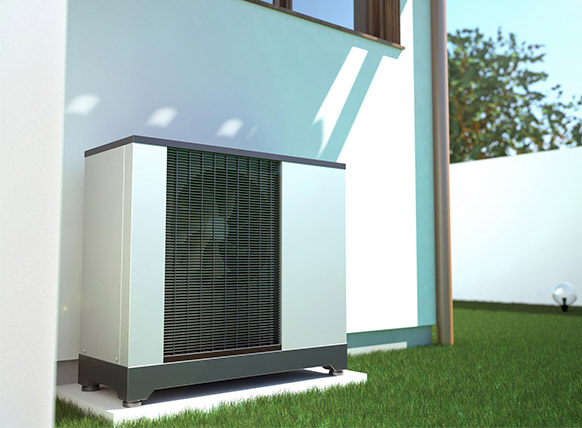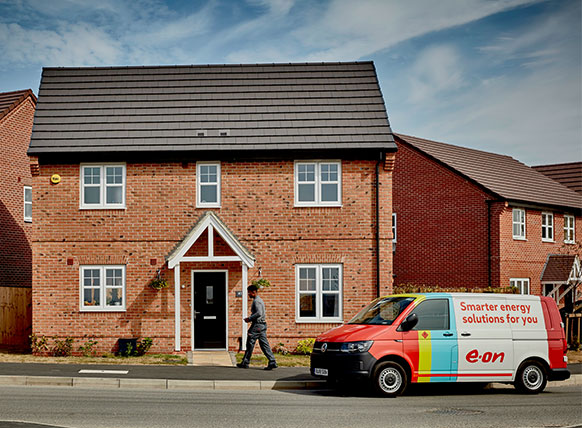What are the pros and cons of air source heat pumps?
Many people may feel like they don’t know enough about heat pumps. So, we’ve asked one of our air source heat pump engineers, Adam, to share the pros and cons of heat pumps and why we should all be considering them for our homes over the next few years. Over to you Adam…




With gas prices remaining high and the climate crisis now at the forefront of many people’s minds, more and more people are considering alternative ways to heat their homes.
Plus, the Government is encouraging people to choose low-carbon heating solutions, mainly heat pumps, through its Boiler Upgrade Scheme (BUS). Under the scheme, the government is offering homeowners £5,000 towards the cost of replacing their existing heating system with a high efficiency heat pump.


1. Let’s start by explaining what an air source heat pump is and how they work
An air source heat pump is a renewable energy system that quite simply uses the energy from the outside air to provide your home with heating and hot water.
They work in a similar way to a fridge freezer but in reverse, extracting energy from the air and using it to warm your home. An evaporator contained in the heat pump absorbs the energy from the air, as this air is absorbed a refrigerant gas is boiled at a very low temperature. The system then compresses it to increase the temperature to a useable heat. This is then transferred into your central heating and hot water system ready to be transferred around your home.
Heat pumps work in all temperatures and although they can be slightly less efficient during the cold weather, they are still capable of extracting heat from the air and heating your home in temperatures as low as -15oC2, so are more than adequate for even the coldest winters here in the UK.
2. What are the main benefits of an air source heat pump?
The type of heat pump you choose will depend on the type of property you live in, but heat pumps have many advantages. Here are just a few of the main ones:
Heat pumps are more environmentally friendly
Air source heat pump benefits include that it’s a more sustainable option than traditional oil or gas heating, so can help your home to become more energy efficient and reduce your carbon footprint.
Heat pumps require electricity to run, but they use the electricity more efficiently than other heating systems, with a typical heat pump using only about a quarter of the energy needed for a traditional gas boiler3. Plus, if the electricity comes from renewable sources, such as your own solar panels, emissions could be even lower.


They can help to reduce energy bills
While the upfront cost of a heat pump is significant, typically starting at around £6,000, the annual savings can be considerable, particularly if you're changing from old-fashioned systems. An air source heat pump could save up to £1,330 per year compared to old electric storage heaters, or up to £1,410 per year compared to an old LPG boiler4.
You could also get some financial support for installing a heat pump in your home.
- Up until March 2022 you can apply for financial support through the Domestic Renewable Heat Incentive (RHI), a government scheme to encourage investment in renewable energy. While amounts vary according to your home type and existing heating system, it's possible to claim as much as £11,000 back in quarterly payments over seven years.
- From April 2022, the Government is offering grants of £5,000 towards to upfront cost of having a heat pump installed in your home.
They have a longer lifespan than a traditional gas boiler
Typically, a traditional gas boiler lasts up to around 15 years and will become less efficient as time goes on and will have to work harder to heat your home. A well-maintained air source heat pump could last up to 20 years.
3. Are there any disadvantages to having an air source heat pump installed?
As with all heating systems, there are some things to consider, however none of these should prevent you from installing a heat pump, they are just important to be aware of.


Additional upgrades may be required in your home
Whilst the installation of an air source heat pump is relatively simple, your home may need some upgrades to ensure the heat pump can work as efficiently as possible. This could include upgrades to your central heating system, bigger radiators and a new hot water tank if you don’t have one already. Whilst this can be disruptive to your home, it’s important to remember that any upgrades such as these can future proof your home too and work well if you’re undergoing a renovation project at the same time.
Air source heat pumps also work better in homes that are fully insulated so you may need to consider looking into how well insulated your home currently is. There are often grants for loft insulation or free cavity wall insulation schemes available to help you save on cost too.
You need external space to accommodate the fan unit
The heat pump unit needs to sit on the outside wall of your property and needs to have enough space around it so that the air can effectively be drawn into the unit. This could possibly be an issue for some people who may have limited space around their homes.
However, technology is changing all of the time and new types of heat pumps are being developed that are smaller, more stylish and there are now even internal air source heat pumps that can be fitted inside a property, so this shouldn’t be seen as a huge barrier when considering a heat pump.
New research has also shown that with the developments in technology, any home can be suitable for a heat pump5, so you shouldn’t let the type of home you have be a reason to not considering this as a heating option.
As with any heating system and energy efficient solution, there are pros and cons to an air source heat pump, and a few key points to consider before getting one. So it’s really important to be aware of the whole picture when you’re looking at which system would work best in your home and for your individual needs.
For more information about how you can take climate action and other solutions for your home, you can visit our sustainable home hub and you can also find out how we’re taking action for climate here.
1. Which: £5,000 heat pump grants revealed in new boiler upgrade scheme
2. Energy saving trust: Air source heat pumps vs ground source heat pumps
3. BBC: How to cut carbon out of your heating
4. Energy saving trust: Air-to-water heat pumps
5. Catapult energy systems: All housing types are suitable for heat pumps, finds Electrification of Heat project